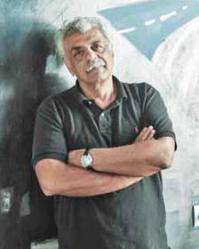Tariq Ali
In Venezuela over the weekend, internationally-acclaimed author, activist, and intellectual Tariq Ali highlighted the importance of Venezuela´s Bolivarian Revolution and socialist President Hugo Chavez. Visiting the country to participate in anniversary celebrations for Telesur, the Caracas-based Latin American news media, the respected British Pakistani historian spoke at the national headquarters of the Bolivarian University of Venezuela (UBV) and told those gathered that “Venezuela must not be lost” as this year´s presidential election approaches.

Democratizing the Media
Discussing the leadership role played by Latin America in consolidating alternative means of communication, New Left Review and CounterPunch contributor Tariq Ali spoke at an event titled, “The Western Media: A Pilar of the State”, providing audiences an opportunity to reflect on the importance of Venezuela´s struggle to democratize the media.
According to Ali, the world is currently suffering through “a prolonged war, implemented by the United States, which is aimed at dominating the world and maintaining US hegemony”. “In this war”, he affirmed, “the means of communication play a fundamental role”. In contrast to the mainstream corporate media which “only reports on ordinary people when there are catastrophies”, he explained that people around the world “are anxious to access alternative media that inform viewers in an open and critical way”. “Above all else”, Ali affirmed, “people want media that reflect the conditions in which ordinary people live and struggle on a daily basis”.
Venezuela-based Telesur, for example, “provides coverage of average people all the time; on the daily suffering experienced by common folk here in Venezuela, in neighboring Colombia, in Chile, all over the place”, he said. While media reports worldwide show the US and Europe plunging us into a “global crisis”, Ali explained, “it is this very same crisis that allowed for the development of alternative means of communication such as Telesur”. “Just seven years ago”, he added, “Telesur rose out of South America and defied the global airwaves; something it has done very well”.
“Since private media no longer allow for critical debate to occur”, Ali said, “this is something the public media must do…We must demonstrate that what Telesur is doing, for example, is the democratic alternative, that we are the ones allowing the people to express themselves”.
According to Ali, media such as Telesur “teach the people to think critically” and, he affirmed, “if this is achieved than we will have played an important role in bringing more balance to the general imbalance that exists in today´s world”.
US Didn't Expect a Chavez
In addition to his discussion on the role of public media in a growingly multi-polar world, the acclaimed author of “Pirates of the Caribbean: Axis of Hope” also used his stop in Venezuela to stress that great care must be taken to defend the advances made by progressive forces in Latin America. The “democratization” that has begun in Venezuela, Bolivia, Ecuador, he affirmed, “is going to be a prolonged and difficult struggle”.
“I always tell my friends in South America”, Ali said, “that no one should think the United States has renounced its hold on the region”. “The US is very displeased with what is happening in South America and they consider it rather unfortunate that a new generation of solidarious, valiant leaders has arisen”, he affirmed.
According to Ali, “the US did not expect the rise of a (Hugo) Chavez, which took them by surprise. The United States thought the parties of the Right would be able to control things (in Venezuela), and they didn´t think Evo (Morales) would win in Bolivia or that (Rafael) Correa would win in Ecuador”.
“This has created panic in Washington and they´ve now launched their counter offensive”, he affirmed. “They have tried to rid themselves of Chavez on numerous occasions”, he explained. “They´ve tried coup d´états, organized oil stoppages, used the media as a weapon of war, always without success”.
“Up until now”, he affirmed, “they´ve failed because we´ve always been able to beat them democratically, with the support of the people… But it would be total foolishness to think that the victories we´ve had in Venezuela, Ecuador, and Bolivia are somehow irreversible”.
US imperialism “has not given up” in Latin America, and “while the United States is certainly debilitated, economically speaking, it is still the most powerful country in the world”. “From a political point of view”, he added, “we must be very careful. We must continue educating the continent, the citizens of the region, and in this process Telesur and other public media are extremely important”.
Venezuela: An Alternative
During his time in Venezuela, Ali was also interviewed by the Venezuelan News Agency (AVN). Speaking to AVN, Ali outlined the importance of the Bolivarian Revolution and its leader, President Hugo Chavez. In contrast to the “official democracy of capitalist countries” which he described as “ever more restrictive”, Ali said Venezuela´s participatory democracy “represents a real democratic alternative”.
“It’s amazing the things people say about Venezuela abroad”, Ali affirmed. “They say Chavez is a dictator, negating the fact that he has had more elections, has won more elections than any other (elected official). Of course”, he added “the only democracies they (the US and Europe) permit are the democracies that do what they say must be done”.
Asked about democratic change in other nations and regions, Ali affirmed that “China is not an alternative, nor is India or Russia. In fact, the only real alternative available in today´s world is found here in South America”.
“In no other place do we observe what we observe here”, he said. “Venezuela”, he explained, “is an alternative precisely because it questions all of the priorities of modern capitalism, using the State on behalf of the poor”.
“That is the importance of Venezuela”, he affirmed.
The Bolivarian Revolution “is very important for all of us, across the globe,” he said, “and we cannot allow ourselves to lose Venezuela”.
T/ COI P/ Radoje Jovanovic
Source: Correo del Orinoco